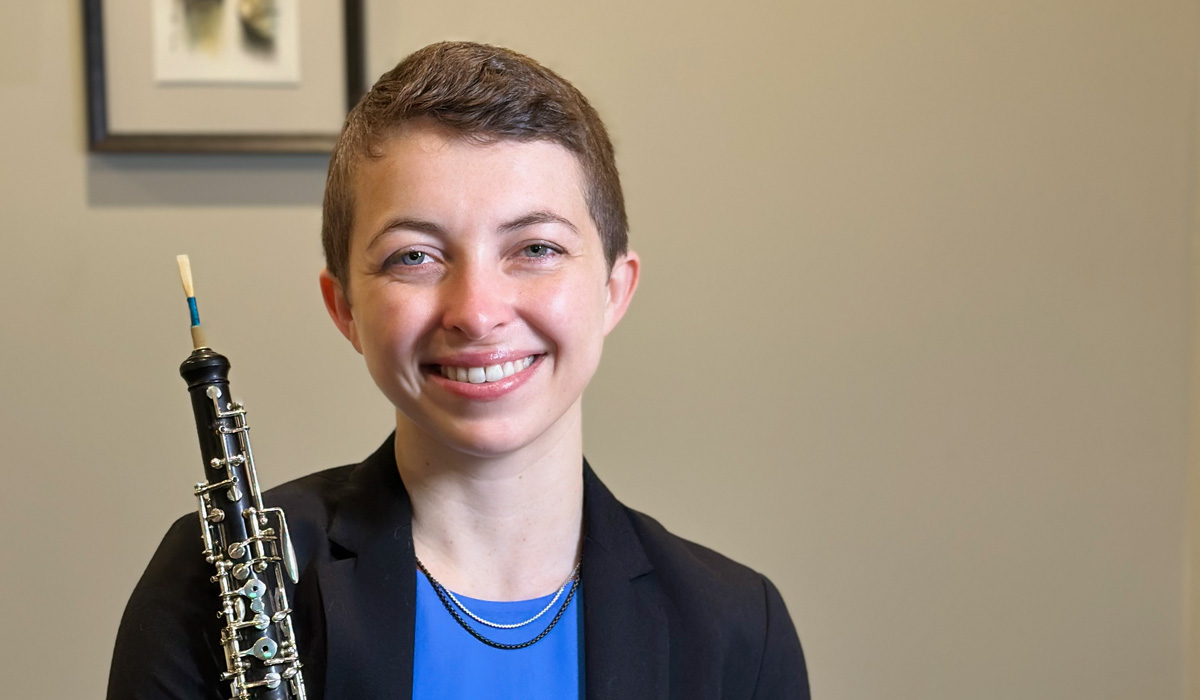Jenna AbuSalim
The MD-PhD candidate in Joshua Rabinowitz’s lab at Ludwig Princeton chats with us about her life, research and music.
Can you tell us a bit about yourself and your family?
I am from a small town in southern Illinois called Effingham—born and raised there. I have a younger brother who is a nuclear engineer in Knoxville and an older sister who lives in Louisville and is a high school special ed teacher. Mom’s a recently retired pediatrician and my dad is a real estate developer for rural areas. And I’m married, I should say. That’s my family now.
When did you get married?
I got married in 2020, we had a lovely pandemic wedding. It was 19 people in a small Italian restaurant, and we had as much food as you could possibly imagine, which was phenomenal.
When did you become interested in science?
My mom was a pediatrician, so that was my initial inspiration, but I actually went to college as a music major. Indiana University has a great program, it’s called a BSOF, which is a Bachelor of Science in Music and an Outside Field, so I did Chemistry and Oboe Performance. I had a fantastic organic chemistry teacher who took me under his wing, and I joined his lab. That’s when I started to fall in love with the research process.
What are you focused on in your research these days?
I focus on how diet affects the gut microbiome, on how it affects the compounds and metabolites the bacteria produce. Are there differences between different types of proteins, dietary processing, as well as different amounts of fiber in your diet? And how does it impact the overall health of your gut microbiome?
What will your field of research have achieved in the next 20 to 30 years?
My hope is that we will give doctors specific therapeutic dietary knowledge. There are some things, like having fiber in your diet, that we’ve known for years. But what types of fiber? Which proteins? How much fat, how much protein—those kinds of things. I think we’ll be able to say “Okay, if you’re going to go on this cancer immunotherapy, you might want to have these nutrients in your diet.” It’ll be another way to tackle diseases, in addition to all the pharmacotherapies we have now. That’s what excites me.
What’s the best career advice that you’ve ever received?
I volunteered for hospice for a couple of years when I was in college and met this amazing man. He had ALS. He supposedly had just six months, but I actually got to stay with him for two years, and it was an amazing relationship. He probably had four different careers in his life and was very inspiring. He said to me, “Jump at any opportunity. If it’s outside of your field of interest or comfort zone, the first couple of months might be really painful, but if you’re dedicated and willing to start off in a place with nothing, you will gain so much.” And I really started. I was in music, sort of thinking about medicine, and I jumped at the opportunity to join an organic chemistry lab, and then I knew I wanted to do more biologically related things, so I jumped at a cancer radiation lab and learned so many things. And now I’m in whole body metabolism.
What do you think could be improved in our approach to scientific research? Is there anything we could do better?
I’m in an ethics class now and something that we discussed in that class that I think would be excellent is if we had a negative results journal. There are so many labs that have these great stories, but they’re just negative stories. There’s nowhere really to publish that work. So other people spend time and resources on the same hypotheses because they don’t know that somebody else has already proven them untrue.
Do you still play music?
Absolutely. The New Jersey Intergenerational Orchestra here in New Jersey. I think the youngest member is around five and we’ve got a couple people in their 80s. There are people who’ve been playing for a year or two, then 10 years, and then people like me who have been playing for most of our lives. We have a concert in April.
